
Policing and Mental Health: A Working Roundtable Discussion
Arizona State University, Phoenix, AZ
Wednesday, November 30, 2022
The Academy for Justice at the Sandra Day O’Connor College of Law at Arizona State University—in collaboration with the National Organization of Black Law Enforcement Executives (NOBLE)—hosted a roundtable discussion and dinner at the law school to facilitate the exchange of ideas and innovations in the overlapping fields of policing and mental health. A panel of experts examined critical issues within these fields, including alternatives to police response to mental health calls, collaborative efforts between law enforcement and mental health service providers, and effective engagement techniques between officers and those with mental illness.
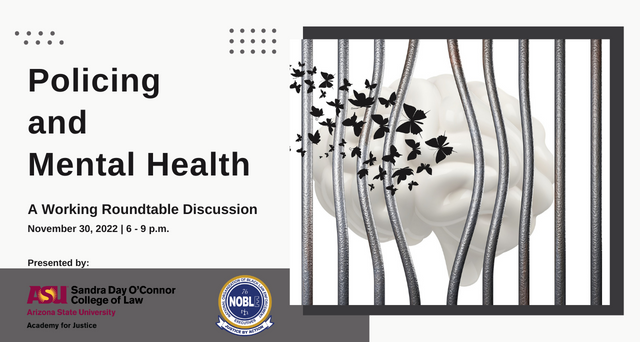
Sponsors
The Academy for Justice was established at the Sandra Day O’Connor College of Law at Arizona State University in July 2018. Its mission is to bridge the gap between academia and on-the-ground criminal justice reform by making scholarly research and ideas accessible to policymakers, stakeholders, journalists, and the public. As a scholarly collective, our approach to criminal justice reform is interdisciplinary, pragmatic, and non-partisan.
The National Organization of Black Law Enforcement Executives (NOBLE) serves as the conscience of law enforcement by being committed to justice by action. Founded in September 1976 during a three-day symposium to address crime in low-income urban areas, NOBLE is currently comprised of 59 chapters in six regions throughout the United States with members in Canada, the Caribbean, the United Kingdom, and several countries in Africa. Whether members are engaged in a food or clothing drive, presenting the Law and Your Community, reading to children, awarding scholarships, or talking with young people about safety—be it traffic safety, gun safety, internet safety, bullying or HIV/AIDS prevention—NOBLE cares!
Event Speakers
Opening Remarks

Andre C. Anderson
Executive Assistant Police Chief, Tempe Arizona Police Department
Andre C. Anderson is an Executive Assistant Police Chief with the Tempe Arizona Police Department. As a police leader, Andre has served in law enforcement for more than 35 years, combining two years of service from the Arizona Department of Corrections. Andre has served in a leadership role for over 22 years and has been fortunate to serve over every leadership command of a modern-day police department. He has served in every rank, from an officer to detective to Executive Deputy Chief, Executive Assistant Chief and Interim Police Chief. He holds a Masters Degree from Northern Arizona in Education and Leadership. His career includes, but is not limited to, leading the Glendale Police Department Criminal Investigations Division’s Homicide and all investigative Units, the Special Events Division responsible for national and local events, include working with the NFL Arizona Cardinals leadership, Phoenix Coyotes, the NCAA Final Four, major soccer events, and nationally recognized entertainer, SWAT, Traffic, Bombs, and Emergency Management. He has led community policing and community engagement squads and has taught and traveled abroad, helping organizations learn the concepts of community policing.
Andre C. Anderson served as the Special Assistant to the National President of the National Organization of Black Law Enforcement Executives (NOBLE). He was also the NOBLE Region VI President and local Arizona President. With NOBLE, he was tasked with developing a response to engage national community dialogue and working with others to usher in methods designed to build trust and legitimacy from lessons learned from his stent as the Interim Police Chief in Ferguson MO, working the DOJ and incorporating the President’s Task Force on 21st Century Policing. Under President Obama’s administration, the United States President’s office called upon him and the NOBLE President to travel to Charlotte NC to serve with others to ease tension stemming from protest.
Andre is most known for serving as Executive Deputy Police Chief of Rochester, New York, and the Interim Police Chief in Ferguson, Missouri, both police departments facing several national concerns after the wake of the Daniel Prude death and the Mike Brown JR shooting coined as the new ground zero and civil rights destination of the nation. During his tenure at both locations, he led successful conclusions to civil unrest, which eased tension, created better relationships in the community, introduced and led modern-day evidence-based community policing, and was the initial lead policing expert to negotiate with the Department of Justice Consent Decree levied as a “Pattern or Practice of Discriminatory Policing.” For his role in Ferguson, he was inducted into the National Law Enforcement Museum, Washington DC
Assistant Chief Anderson strongly believes that “identifying dedicated police professionals who exemplify the organization’s image while remaining committed to community policing and the organization’s values are the keys to success.”
Co-moderators
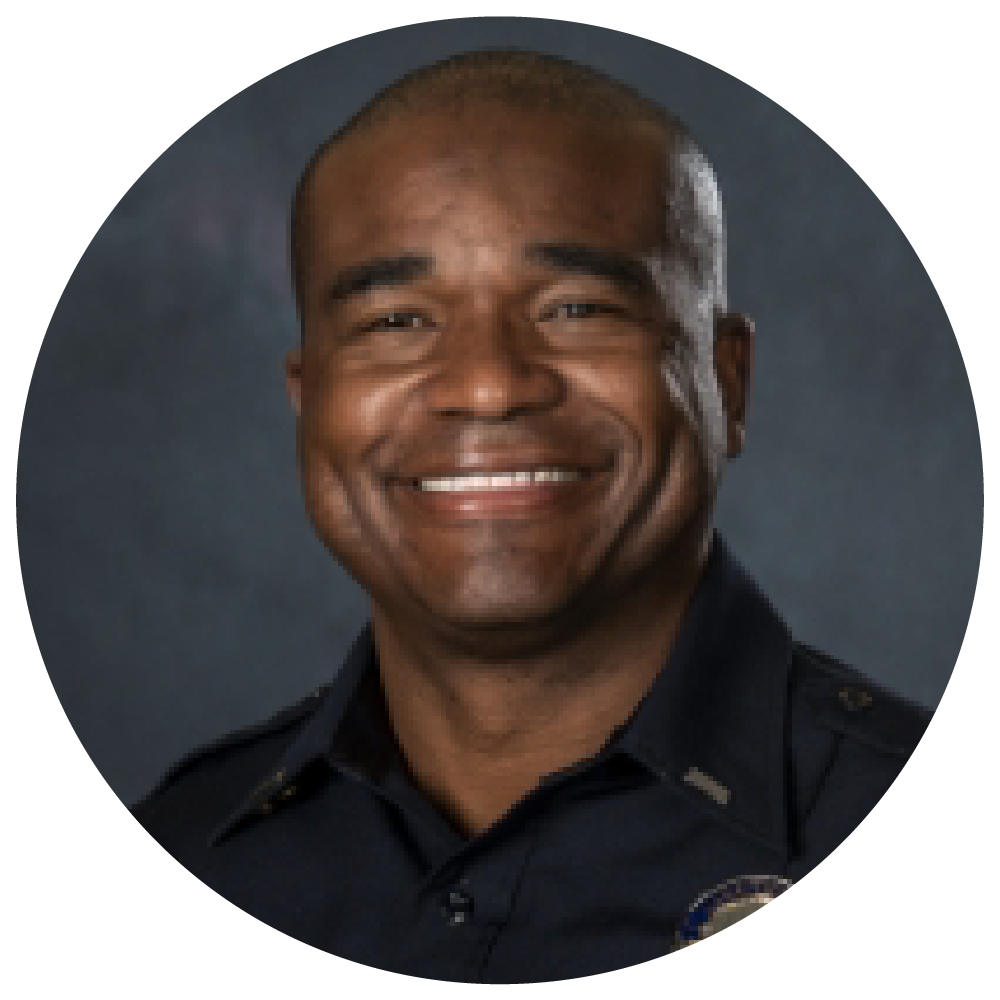
Rashidi Johnson
Lieutenant, Tempe Police Department
Lt. Johnson has been with the Tempe Police Department for 20 years and has served with humility in many capacities. Lt. Johnson served as a patrol officer, where he responded to high-risk calls for service, investigated crimes of violence, property crimes, narcotics, and interacted with the community regarding concerns and outreach. Lt. Johnson served in the downtown district as a bike officer, where he investigated aggravated assaults, disorderly conduct, and crimes related to alcohol. Lt. Johnson also served in the Special Investigation Bureau as an undercover detective. He conducted narcotics investigations, VICE investigations, human trafficking, and large-scale drug trafficking investigations that included Maricopa County T-3 wiretaps. Lt. Johnson also served ten years on the SWAT team, where he responded to barricades, search warrants, and fugitive apprehension operations.
Lt. Johnson was promoted to Sergeant in 2013, where he supervised teams with the objective that they provide quality service to the community. Lt. Johnson served in Internal Affairs as a Sergeant, where he was responsible for ensuring transparency and accountability within the Tempe Police Department. In 2020 Lt. Johnson was promoted to the rank of Lieutenant where he served as the watch commander in the Field Operations Division, ensuring the community received quality service by using the best practices approach to operational readiness. Lt. Johnson served in the training and hiring unit where he was responsible for hiring, recruitment, retention, and ensuring best police practices. Currently, Lt. Johnson serves in Central Bureau where he is responsible for downtown Tempe.
Lt. Johnson is married with two kids, has two dogs, is grounded by his faith in Christ. Lt. Johnson is the Arizona Chapter President of the National Organization of Black Law Enforcement Executive (NOBLE); he has a bachelor’s in Political Science and a Master’s in Organizational Leadership.
Erik Luna
Amelia D. Lewis Professor of Constitutional & Criminal Law; Faculty Director of the Academy for Justice, Sandra Day O’Connor College of Law at Arizona State University
Professor Luna teaches and writes primarily in the areas of criminal law and criminal procedure. Luna has received two Fulbright awards. In 2000, he served as the senior Fulbright Scholar to New Zealand at Victoria University Law School (Wellington, NZ). In 2016-17, he was the Fulbright Distinguished Chair at the University of Birmingham (Birmingham, UK). Luna has also been a visiting scholar with the Max Planck Institute for Foreign and International Criminal Law (Freiburg, DE), a visiting professor with the Cuban Society of Penal Sciences (Havana, CU), a visiting professional in the Office of the Prosecutor of the International Criminal Court (The Hague, NL), and a research fellow with the Alexander von Humboldt Foundation (Bonn, DE). Prior to coming to ASU, Luna was the Sydney & Frances Lewis Professor of Law at Washington and Lee University, and before that, he was the Hugh B. Brown Chair in Law at the University of Utah. Luna is a member of the American Law Institute and an adjunct scholar with the Cato Institute. He graduated summa cum laude from the University of Southern California and received his J.D. with honors from Stanford Law School. Upon graduation, Luna was a prosecutor in the San Diego District Attorney’s Office and a fellow and lecturer at the University of Chicago Law School.
Expert panel
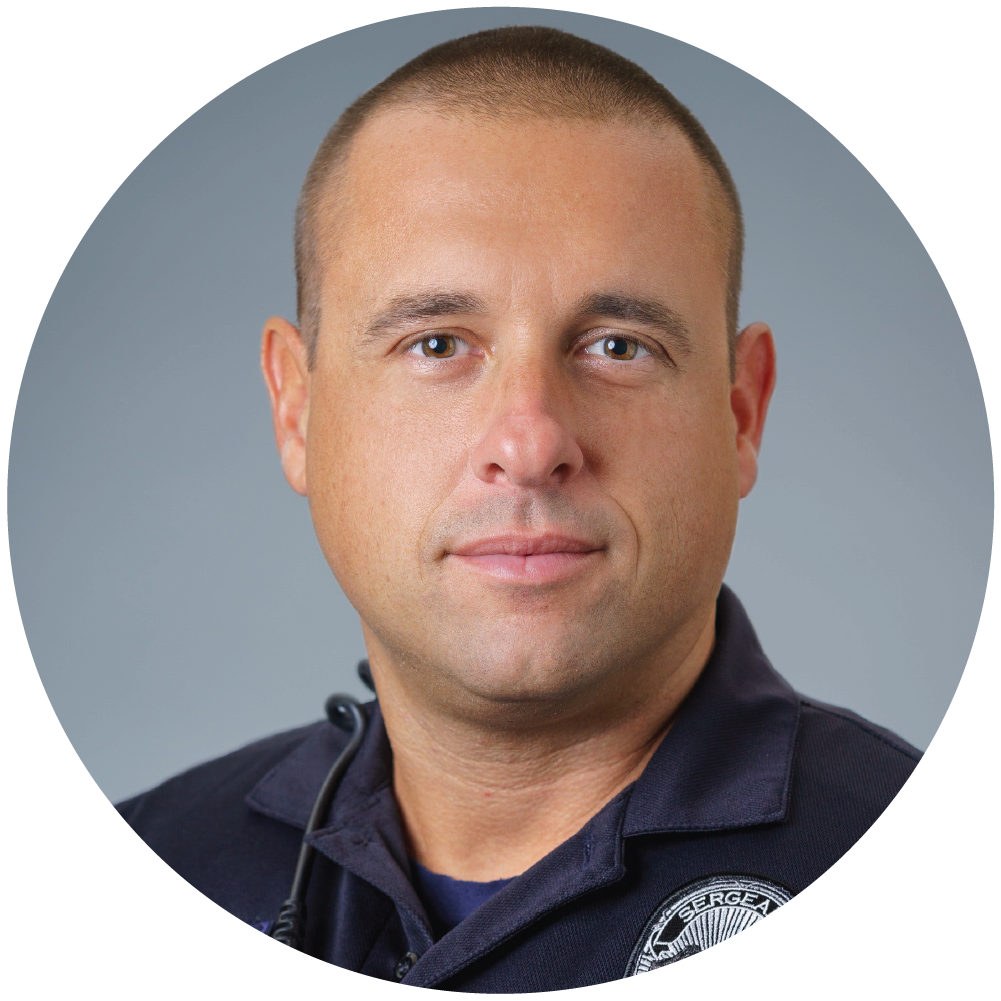
Sergeant Rob Ferraro
Police Sergeant, Tempe Police Department
Rob is a Tempe Police Sergeant who brings over fifteen years’ experience working to improve public safety the quality of life in the community, by effective integration and utilization of the Public Behavioral Health System. As Co-Coordinator for the Phoenix-Metro CIT Program, he has direct experience in training as well as extensive experience working directly with individuals in crisis, homeless individuals, and the Regional Behavioral Health Authority (RBHA) and oversees the department’s innovative Opioid Response Program. Rob works closely with Community Behavioral Health, Law‐Enforcement, and various community stakeholders, by developing and helping to connect silos of care and services.
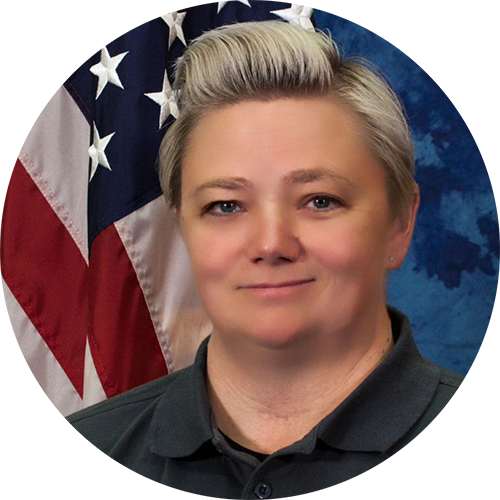
Amanda Stamps
Training and Community Development Coordinator, Community Bridges
As a champion for human rights and human wellness, Amanda Stamps has over 20-years of serving in various capacities. For over 23-years, Ms. Stamps worked with the Mesa Police Department as a patrol officer, a field training officer, a detective with the Special Victim’s Unit, a member of the peer support team, Community Engagement and Youth Development, and most recently, the department’s Crisis Intervention Team Program Coordinator. During her time with the Mesa Police Department, she helped create and coordinate the Crisis Response Team and presented on topics related to crisis and law enforcement practices, focusing on crisis response; the fidelity of CIT programs; autism response for law enforcement; and issues between law enforcement and the community. In 2003, Ms. Stamps obtained her M.Ed. in Counseling and Human Relations from Northern Arizona University and is currently pursuing a PhD in Behavioral Health from Arizona State University. Ms. Stamps is currently a reserve officer with the Mesa Police Department and works for Community Bridges, Inc.—a local non-profit whose mission is to maintain the dignity of human life—as the Training and Community Development Coordinator. Additionally, Ms. Stamps was a founding member of the Arizona CIT Association and serves as the 1st Vice President of its Board of Directors. Ms. Stamps also serves on the board of Mental Health America Arizona and St. Luke’s Behavioral Health Hospital.
Ms. Stamps is a nationally recognized presenter and trainer specializing in crisis and law enforcement practices. She was involved in creating the Crisis Response Team for the Mesa Police Department in 2015 and the current co-responder model within the Crisis Response Team. Ms. Stamps has worked statewide to develop CIT Programs while maintaining national, evidence-based standards. Throughout her career, she has focused on bringing professionals together to meet the needs of community members. To support that goal, she has engaged in ongoing academic studies and developed strong relationships throughout the behavioral health system to address the mental health needs of those involved with the justice system.

Jesse Trevino
President and Co-founder of SolutionPoint+
Jesse is the President and Co-founder of SolutionPoint+, the international consulting and training firm. He is a United States Marine Corps combat veteran, having served in both Operation Enduring Freedom and Operation Iraqi Freedom. Jesse joined the San Antonio Police Department in 2010 and served for over 10 years. He worked on the Mental Health Unit and implemented nationally recognized programs addressing mental illness, homelessness, and chemical dependency. He went on to serve as an instructor and training coordinator at the San Antonio Police Training Academy, one of the top police academies in the nation.
After promoting to detective, Jesse became the threat assessment program coordinator for the Southwest Texas Fusion Center, establishing the current national model for behavioral threat assessments in law enforcement. He has an A.A. from Northwest Vista College, a B.A. in Criminal Justice, and an M.S. in Criminal Justice and Criminology from the University of Texas at San Antonio. He is currently pursuing a Ph.D. in criminal justice from Walden University. Jesse’s expertise includes program evaluation, threat management, and mental health jail diversion processes.

Amy C. Watson
Professor, Helen Bader School of Social Welfare, University of Wisconsin Milwaukee
Amy C. Watson, PhD is a professor at the Helen Bader School of Social Welfare, University of Wisconsin Milwaukee. Dr. Watson’s work throughout her career has been focused on improving services and reducing the involvement of people with mental illnesses in the criminal legal system. She has served as PI on several completed and an upcoming NIMH-funded study of the Crisis Intervention Team (CIT) model, which is a police-based model of crisis response. She has led and collaborated on studies examining the experiences of persons with mental illnesses in encounters with police and their preferences for crisis response models.
Dr. Watson’s current work is also focusing on developing non-police crisis response services and preventing people with serious mental illnesses from coming in contact with the criminal legal system. She is leading a Sozosei Foundation funded project to develop a Strategic Research Framework to Decriminalize Mental Illness and a NAMI National funded project focused on developing the workforce for non-law enforcement crisis response. Additionally, she is involved in evaluating multiple initiatives to expand behavioral health services in Illinois, and the transition to 988 in Illinois and New York. Dr. Watson’s professional interests in this work stem from her early career experience as a probation officer on a specialized mental health team.

Clair White
Assistant Professor, University of Wyoming
Clair White is an Assistant Professor at the University of Wyoming. After completing her PhD in Criminology and Criminal Justice at Arizona State University, she worked at the Center for Evidence-Based Crime Policy at George Mason University where she led data collection efforts on a large longitudinal study on crime hot spots in Baltimore. Her research interests include the criminal justice system’s response to mental health problems, particularly police responses to mental health crisis calls, as well as understanding health and other social problems at crime hot spots. Currently, she is partnering with local agencies in Wyoming to develop and evaluate co-responder teams in law enforcement. She also has extensive experience with survey research design and primary data collection. Her most recent research has been published in a number of journals including Journal of Research on Crime and Delinquency, Criminology & Public Policy, Victims & Offenders, Journal of Criminal Justice, Prevention Science, American Journal of Preventive Medicine, British Journal of Criminology, and Policing: A Journal of Policy & Practice.
Closing Remarks
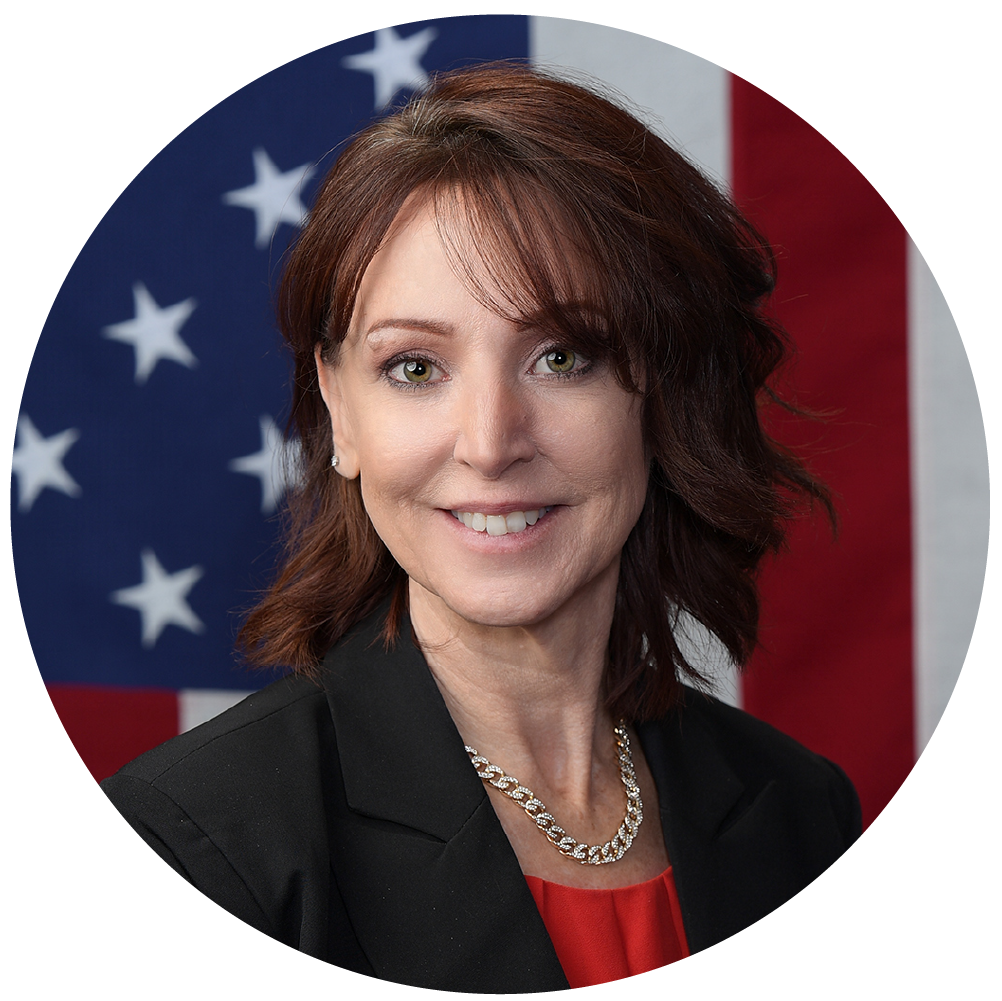
Cathryn Masters
Assistant Chief for the Support Services Division, Tempe Police Department
Cathryn Masters serves as Assistant Chief for the Support Services Division of the Tempe Police Department, housing important roles including Budget, Personnel Services Bureau: Hiring and Training, Detention; Administrative Services Bureau: Records, Property, Policy & Accreditation; and the Communications Bureau. She is a Retired Police Commander, Communications Director and proud US Army Veteran. ACOP Masters also serves as an Associate Professor with Northern Arizona University for the Justice and Intelligence Studies program as a member of their leadership and diversity faculty. She also holds a Certificate in Public Sector Human Resource Management from George Washington University. Cathy is proud graduate of the Senior Management Institute for Policing (SMIP) Class #85 and IACP’s Leadership in Police Organizations (LPO) Class #19. She holds an Associate Degree equivalent from the Defense Language Institute Foreign Language Center in Arabic and Middle Eastern Studies, earned her undergraduate degree in Public Safety Administration from Grand Canyon University and a Master’s Degree with Distinction from Northern Arizona University in Organizational Leadership with an Emphasis in Justice Studies. Cathy is the founder and Past Chair of the Arizona Women’s Initiative Network, a non-profit 501c3 organization which serves to engage and promote more women public safety positions. She serves as Lead Curriculum Advisor for AZ Doeg Nelson Chapter of National Organization of Black Law Enforcement Executives, is the Vice-President of the Arizona Justice Educators Association Board and serves on the Board of Advisors for the Justice Educators Oversight Board of the East Valley Institute of Technology. ACOP Masters makes her home in the greater Valley area and is a native Arizonan.
Resources
Statutes and Ordinances
36-520
Application for evaluation; definition
36-523
Petition for evaluation
36-524
Application for emergency admission for evaluation; requirements; immunity
36-525
Apprehension and transportation by peace officers; immunity
36-529
Order for evaluation; order for detention; hearing; personal service of court orders
13-1204(8)(e)
Aggravated assault; classification; definitions
Secondary Sources
Housing not Handcuffs 2019
Ending the Criminalization of Homelessness in U.S. Cities, National Law Center on Homelessness & Poverty
Searching Out Solutions
Constructive Alternatives to the Criminalization of Homelessness, United State Interagency Council on Homelessness
The 2020 Annual Homeless Assessment Report (AHAR) to Congress, The U.S. Department of Housing and Urban Development
Assessing the Impact of Crisis Intervention Teams-A Review of Research
Decoupling Crisis Response from Policing
A Step Toward Equitable Psychiatric Emergency Services
Do Crisis Intervention Teams Reduce Arrests and Improve Officer Safety
A Systematic Review and Meta-Analysis: The 2020 Annual Homeless Assessment Report (AHAR) to Congress, The U.S. Department of Housing and Urban Development
Effectiveness of Police Crisis Intervention Training Programs
What Research on Crisis Intervention Teams Tells Us and What We Need to Ask
Intellectual Developmental Disability Binder
The Stumbling Block to One of the Most Promising Police Reforms
People with Mental Illness, 2nd Edition
About Criminal and Juvenile Justice
Police-Mental Health Collaboration (PMHC) Toolkit
MH and Criminal Justice Fact Sheet
How Do Police Officers Experience Interactions with People with Mental Illness
Mental Illness Substance Use Disorder and Homelessness Executive Summary
Lake v. Cameron
O’Connor v. Donaldson
Olmstead v. Zimring
Overlooked in the Undercounted
Principles of Community-based Behavioral Health Services for Justice-involved Individuals A Research-based Guide
Reconciling Mental Health, Public Policing and Police Accountability
The “Gray Zone” of Police Work During Mental Health Encounters
What Works and What Doesn’t When Policing People with Mental Health Issues
Problem Statement
Click here to read the problem statement for the roundtable which will help guide the discussion surrounding policing and mental health.


